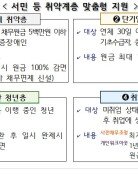[Opinion] Rising Health Care Costs
[Opinion] Rising Health Care Costs
Posted December. 04, 2006 06:44,
Updated January. 04, 2018 15:36
Ever since the national health insurance budget went into the black in 2003, its surpluses have built up for three consecutive years until last year. The reason was largely twofold: government funds were injected into the health insurance budget for insured community residents, and national health promotion funds increased dramatically, with the price of a pack of cigarettes rising by 500 won in December 2004. Around this time last year, Kim Geun-tae, the then-minister of health and welfare, announced 뱈oney-guzzling?pork-barreling measures such as reducing people뭩 share of cancer treatment costs and subsidizing meal expenses in hospital, boasting, 밇xpanded insurance benefits뾬ne of the Participatory Government뭩 election pledges뾞re coming true.?
A year has passed, and the government increased health insurance premiums the day before yesterday, saying the national health insurance budget is suffering huge losses. National health insurance premiums go up every year, but this year뭩 increase rate of 6.5 percent is just too high compared to 3.9 percent of last year. The premium hike in real term is actually much higher than 6.5 percent, given that the previous year뭩 wage increase rate (an annual average of 5.5 percent) is reflected in the calculations for insurants in the workplace in every April, and that tax base increase and income increments are reflected as well for insured community residents in November. This is tantamount to dropping another 밷omb?of health insurance premiums on people who are already suffering from heavy taxes.
Expansion of insurance coverage is good news for now. Be it households, businesses or governments, however, it is imperative to draw up an expenditure plan based on considerations for possible income inflows. What the Ministry of Health and Welfare (MOHW) did was the exact opposite. Its budget management plan was based on a 뱎resumed income?of 410 billion won that it claimed would be generated from increasing cigarette prices, but the Ministry of Planning and Budget (MPB) cut government funding. With its expectations unmet, the MOHW passed on its deficits to the people by significantly increasing national health insurance premiums.
For the national health insurance budget to become sound and healthy, it needs to 밽o on a diet?first. Korea뭩 national health insurance spends two trillion won per annum on treatments of cold, an illness that is said to 밾eal in a week if you see the doctor, and in seven days if you do not see the doctor,?while it does not fully provide coverage for severe disorders such as cancer and chronic diseases. Nevertheless, the government is reluctant to reduce insurance benefits on cold and other mild ailments, fearing possible resistance from the public. Spending as low as 3,000 won for cold treatment and as high as three million won for cancer treatment is huge loss for people, too; all the health insurance budget, after all, comes from taxpayers뾵hether it be taxes or insurance benefits. The saying, 밫here is no free lunch,?explains this.
Chung Sung-hee, Editorial Writer, shchung@donga.com






